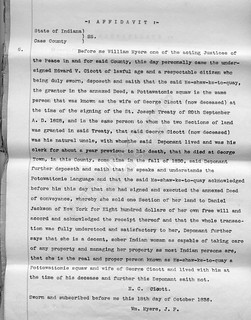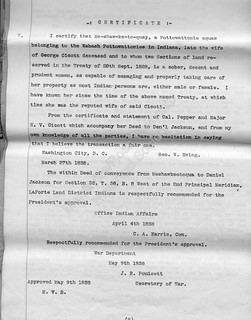
(Click on image to enlarge)
Image courtesy of the Merrillville/Ross Township Historical Society.
What struck me was Edward Cicott's description of his aunt-by-marriage: "a decent, sober Indian woman as capable to taking care of any property and managing her property as most Indian persons are." In all of the title documents I've looked at, I have never encountered any such characterization. The affidavits I've seen have dealt with factual matters: "I know So-and-so to be who he says he is," or "I was well acquainted with Such-and-such and she died five years ago."
I suppose the Indian Affairs Bureau wanted this affidavit to ensure (or to give the appearance of ensuring) that Me-shaw-ke-to-quay was not being taken advantage of in the sale of her land.
The land she was selling was Section 36, Township 36 North, Range 8 West of the Second Principal Meridian:

(Click on image to enlarge)
Image from 1939 Plat Book. Don't ask me to explain Clark and Dearborn Streets.
I have marked the Hoffman eight acres at the section's southern edge because the abstract in question came to us through the purchase of that land in 1924.
Earlier in the abstract is a statement that Me-shaw-ke-to-quay held formal title to the land through a treaty made in 1828:

(Click on image to enlarge)
Image courtesy of the Merrillville/Ross Township Historical Society.
This may be what is meant by the term "floating claim." Per the treaty, Me-shaw-ke-to-quay was entitled to select two sections of undeveloped land within a certain region. This Section 36 was one of her selections. I don't quite understand the timeline: Me-shaw-ke-to-quay sold the land in 1836, but her selection of it wasn't formally approved in Washington until 1837, if this abstract is correct.
All I know about Me-shaw-ke-to-quay is that she was Potawatomi, and married a white man, George Cicott. He is almost as elusive. A 1913 history of Jefferson Township, Cass County,[1] gives us a little information:
George Cicott was the first white man to set foot within the present boundaries of this township. He was a French-Canadian who for many years lived and traded with the Pottawattomie Indians and married an Indian wife.George had an older brother, Zachariah, who seems to be a bit better known, and this essay about Zachariah gives some interesting context.
The Indians looked upon him as one of their number and he was, so far as the rights and privileges of the tribe were concerned. By the treaty of 1826 a reservation of over one thousand acres in the southern part of the township was ceded to him, as were also other tracts of land, including the present site of Logansport. From the sale of these lands he accumulated quite a fortune. Immediately after the cession of these lands in 1826, or possibly 1827, Mr. Cicott settled on his reservation as what was afterwards known as Georgetown, and opened a trading post and dealt almost exclusively with the Indians, as there were at the time no white settlers in the township. He erected the first mill in the township in 1829 near the present site of Georgetown … Mr. Cicott died about 1833.[2]
In spite of the "fortune" that George Cicott accumulated for himself, by 1836 his widow was "poor and destitute," according to our title abstract:

(Click on images to enlarge)
This image, and the images below, courtesy of the Merrillville/Ross Township Historical Society.

I cannot identify the purchaser, Daniel Jackson.
An interpreter was involved in at least part of the transaction:

Everyone (except perhaps the buyer) was in Cass County at that time. I have no evidence that Me-shaw-ke-to-quay ever lived on this Section 36.
In addition to the affidavit of her nephew with which I began this post, another trader named George W. Ewing certified, in 1838, to Me-shaw-ke-to-quay's competence to conduct the transaction …

… but based on what I've learned about him, I wouldn't take his word for it. (And I'm not sure Edward V. Cicott was any better.)
George Ewing uses much the same language as Edward Cicott did to describe Me-shaw-ke-to-quay: "sober, decent and prudent." Now, I can understand "sober" and "prudent," but what does "decent" have to do with competence to sell one's land?
_______________
[1] Powell et al. (eds.) History of Cass County, Indiana. Chicago and New York: The Lewis Publishing Company, 1913. Reproduced at https://play.google.com/books/reader?id=exgVAAAAYAAJ&pg=GBS.PA616&hl=en.
[2] Most sources give 1833 or 1832 as the year of George Cicott's death; it's interesting that Edward Cicott gives it as 1830 in his affidavit.

2 comments:
When would have these old documents been typed up?
I think they probably were all typed up as part of the 1924 purchase of those 8 acres by the Hoffman family. Since it was such a small parcel, the Hoffmans wouldn't have "inherited" earlier abstracts, as the Harmses did when they purchased those 80 acres in Ross Township. Some of the name misspellings (e.g. "Cal. Pepper" instead of "Col. Pepper") may have come from people not being able to read the old handwritten records.
Post a Comment